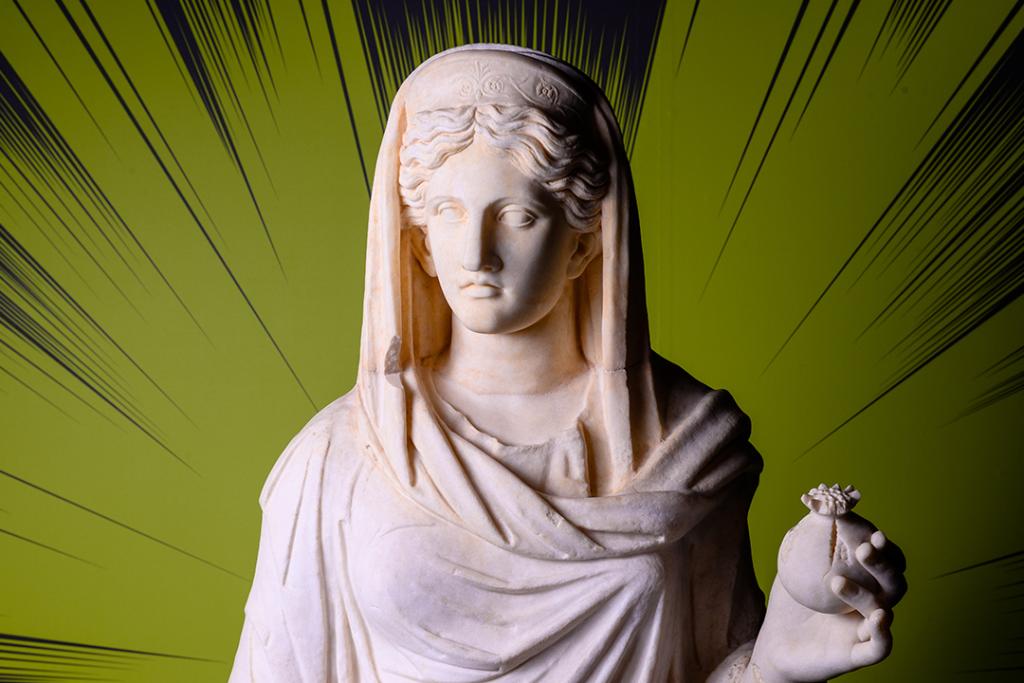Zeus and Hera: infidelity and revenge
Hera, the mean girl of Mt. Olympus. Zeus, the wayward philanderer. So hey, how did they meet? How was their relationship? And what does that say about greek mythology? Author and Greek mythology expert Liv Albert answers all.

As the king and queen of the Olympian gods, you might expect Zeus and Hera to have a nice, healthy, loving relationship…But then, that wouldn’t be particularly fitting with the wider world of Greek mythology. Like most of the gods of Olympus, their relationship and characters are flawed and dangerous and, most importantly, interesting.
Zeus and Hera are two of the six first generation Olympian gods, both children of the famed Titans Cronos and Rhea (yes, this does mean they’re siblings but it’s best not to dwell on that). Their lives began tumultuously: Cronos famously developed a habit of devouring his children in an effort to avoid any one of them becoming more powerful than him. It was only when the last child was born, Zeus, that machinations were put into place to allow Zeus to overthrow Cronos, free his siblings, and take his place on the throne of Mount Olympus. After a couple of short-lived (but procreative!) relationships with the Titan goddesses Metis and Mnemosyne, Zeus finally settled down with the goddess, Hera. Settled is perhaps the wrong word, the couple were rarely content together and their marriage vows would not stop Zeus from spawning more gods and mortals.
Zeus spends the majority of his mythological stories finding mortal women with whom to procreate, spawning hero after hero. Many of the most famous heroes and characters of myth were the children of Zeus, but unlike movies like Disney’s Hercules might have you believe, their mother was almost never Hera. The heroes Heracles (better known as Hercules, his Roman name), Perseus, Minos, Sarpedon, and the twins Castor and Polydeuces among others, and gods like Apollo and Artemis, Athena, Hermes, Dionysus, and the Muses, were all children of Zeus with women and goddesses that were not Hera.
However, for all Zeus spawned many (hundreds wouldn’t be a stretch!) famous mythological figures with other women, goddesses, and nymphs, Hera and her husband did have a few famous children of their own. The god of war, Ares, the goddess of childbirth, Eileithyia, and the goddess of youth, Hebe, were all the product of the king and queen of the gods’ marriage. In some sources the god Hephaestus was another of their children, though other sources quite convincingly attribute his parentage to Hera alone.

Together the pair ruled over Mount Olympus and the rest of the deities and humans of Greek mythology. Zeus was the king of the gods, the god of the weather, the sky, fate, and the rule of law. He loved to wield a lightning bolt and send thunderous echoes throughout the mortal world. Hera, meanwhile, was queen of the gods and goddess of marriage and women.
It is not lost of feminists of the modern world that the goddess of women was so often spending her time punishing mortal women for the actions of her husband. To say the ancient Greek sources were a product of their time is the understatement of a lifetime! Some of the couples’ most famous stories revolve around such punishments. When Zeus impregnated the mortal princess Semele with the god Dionysus, Hera caused her tragic death before her son was even born (Zeus sewed the premature baby into his thigh to continue to gestate!). When Zeus 'fell in love' with a woman named Io and transformed her into a cow to avoid Hera’s wrath, Hera found out the truth anyway and caused her to wander the earth pursued by a very annoying gadfly! But Hera didn’t always direct her wrath at the women: the most famous subject of her ire was the hero Heracles who was born to Zeus and a mortal woman named Alcmene. Hera devoted Heracles’ entire lifetime to attempting to kill him with varying degrees of creativity. Eventually, though, she had to give up when he was deified in death and brought to live on Mount Olympus and marry Hera’s own daughter, the goddess Hebe.
Hera’s attempts to punish these mortals and heroes might be the most famous of her stories, but there was one instance where she went even further in her fury. She attempted a coup on Olympus! Hera, frustrated for all her husband’s infidelities and general tyranny, colluded with a number of other Olympians who felt similarly and attempted to overthrow her husband. She was thwarted by the nymph-goddess Thetis who saved Zeus with the help of one of the monstrous Hecatonchires (the “Hundred-Handers”!), Briareus.

The stories of Hera and Zeus were nothing if not dramatic. Passed on through oral storytelling practices (and later, Greek tragedy) these mythologies provided a certain type of entertainment and in some instances, status. The children that resulted from Zeus’ many relationships spanned the Greek world, not only connecting individual regions to the deities they worshipped but also to each other. While today Zeus’ actions are understood to be abhorrent, his legendary status in Ancient Greece meant that if your local region was connected to him through his lineage then he put you on the map. While his infidelity and Hera’s revenge may not seem particularly godlike by modern standards, the myths and stories of Ancient Greece weren’t used as moral guides like we might expect. The gods were complex and flawed and very human in their nature. Mortals, rather than looking to the gods as an example, feared their wrath and worked to keep them happy to avoid their scorn, no matter how unfairly this landed across the genders. If we can learn anything about Hera and Zeus, it’s that you wouldn’t want to cross them and the Greeks knew just that!
